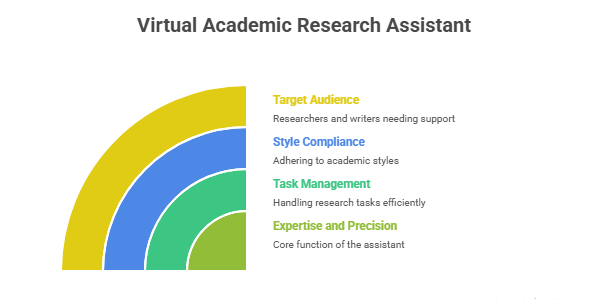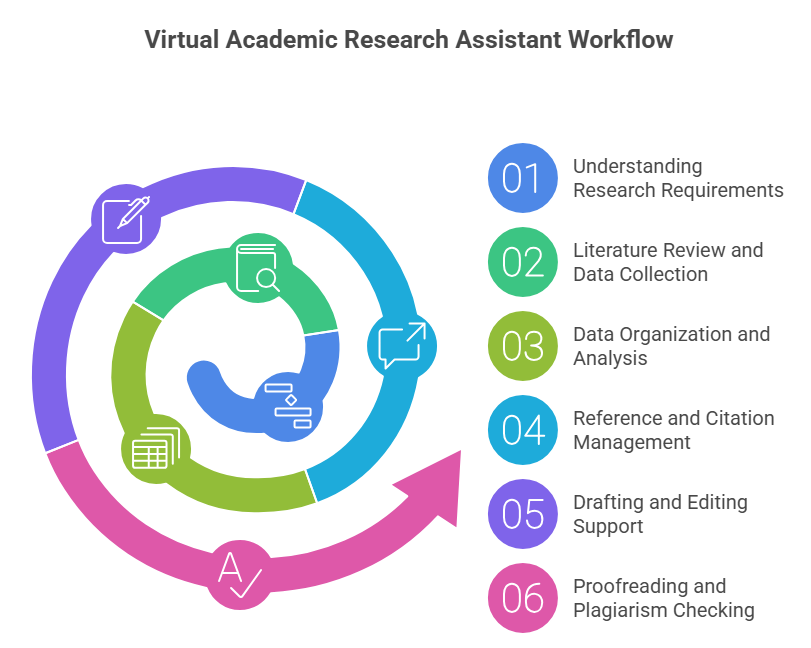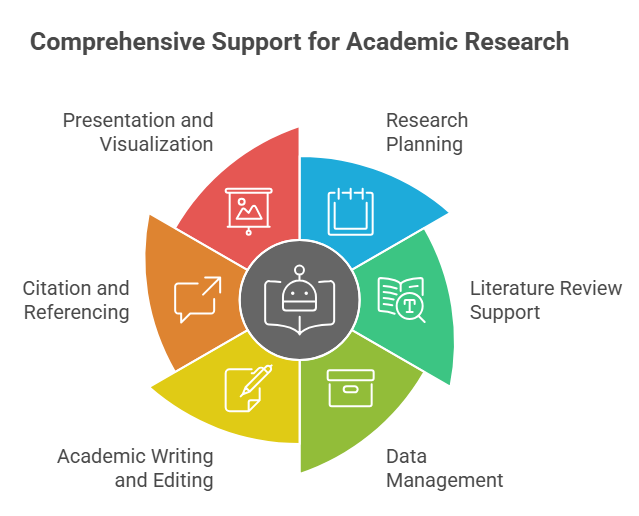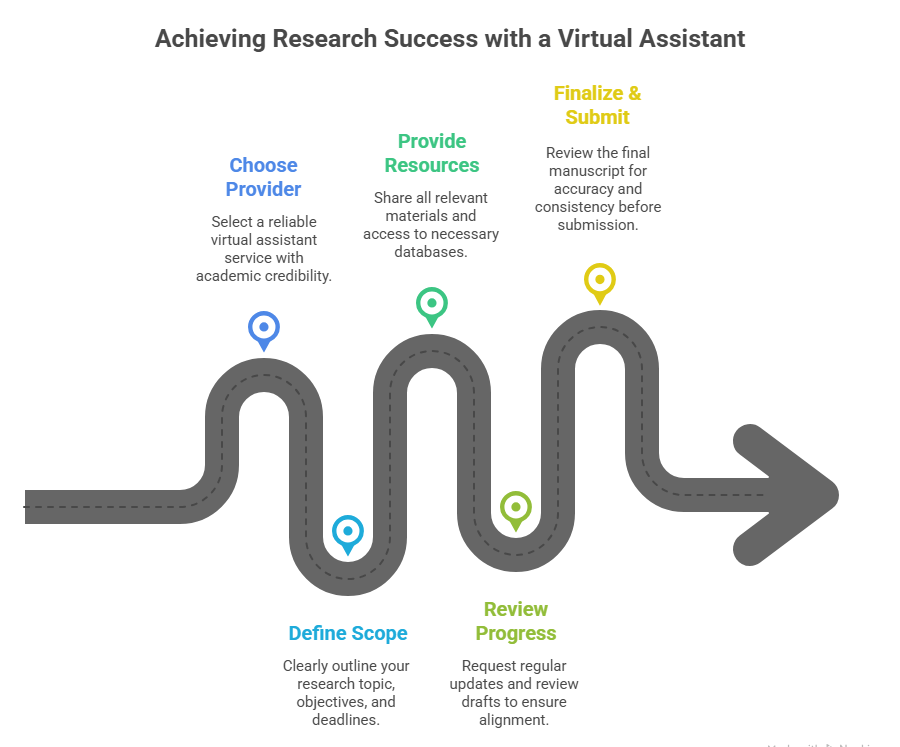
How A Virtual Academic Research Assistant Simplifies Academic Tasks
A Virtual Academic Research Assistant helps students, professors, and researchers manage their academic workflow efficiently. From literature reviews and data organization to citation formatting and manuscript editing, these assistants save time, improve accuracy, and enhance overall research quality. They combine the precision of academic standards with the speed of digital tools, empowering researchers to produce high-impact scholarly work.
What Is a Virtual Academic Research Assistant?

A Virtual Academic Research Assistant is a remote professional or AI-driven service that supports academic projects with expertise and precision. These assistants specialize in handling scholarly research tasks, ensuring proper referencing, accuracy, and compliance with styles like APA, MLA, or Chicago. They cater to university researchers, PhD candidates, and academic writers managing large, complex, and time-sensitive research projects.
How Virtual Academic Research Assistant Services Work

Every virtual research support process follows a well-structured workflow. The assistant begins by understanding your academic objectives, then moves on to data gathering, analysis, and editing. Below are the detailed stages that outline how a Virtual Academic Research Assistant streamlines your entire research lifecycle.
1. Understanding Research Requirements
This stage focuses on understanding your academic goals, research questions, and intended outcomes. The assistant discusses your project scope, academic discipline, and expected deliverables to create a clear roadmap. Together, you develop a timeline that defines milestones for literature review, data analysis, and final drafting.
2. Literature Review and Data Collection
Once the topic is clear, the assistant begins the process of gathering scholarly resources and credible materials. They search databases like JSTOR, PubMed, Google Scholar, and Scopus for peer-reviewed articles, journals, and books. The assistant ensures every source is recent, relevant, and aligned with your research objectives, making it easy to establish a strong theoretical foundation.
3. Data Organization and Analysis
After data collection, the assistant categorizes and organizes information into structured datasets. They summarize key insights, group findings under thematic areas, and prepare materials for interpretation. In addition, they may assist with statistical analysis using tools such as SPSS, Excel, or R to derive meaningful results.
4. Reference and Citation Management
Managing references accurately is a vital academic requirement. The assistant compiles citations, bibliographies, and footnotes using tools like Zotero, EndNote, or Mendeley. They ensure that all references are consistent, properly formatted, and compliant with your chosen citation style (APA, MLA, Chicago, or Harvard).
5. Drafting and Editing Support
The assistant assists in drafting sections of research papers, proposals, or dissertations. They help improve argument flow, paragraph structure, and clarity while maintaining a formal academic tone. Language, tone, and style are refined to ensure the document meets university or journal publication standards.
6. Proofreading and Plagiarism Checking
Before submission, the assistant performs detailed proofreading for grammar, punctuation, and stylistic consistency. They use advanced tools like Grammarly, Turnitin, or Copyscape to ensure originality and coherence. The result is a polished, professional academic paper ready for publication or submission.
Key Features of Virtual Academic Research Assistant Services

Virtual research assistants offer a wide range of services designed to support different stages of academic work. These features combine technology and expertise to create seamless research experiences. Below are some of the core functions they perform:
1. Research Planning
A VARA helps you develop clear, measurable research goals and define hypotheses or objectives. They assist in structuring a detailed research timeline that aligns with institutional or journal deadlines. With careful planning, you can stay organized and avoid last-minute stress during data analysis or submission.
2. Literature Review Support
Assistants summarize major findings from peer-reviewed literature to provide theoretical grounding for your research. They evaluate previous studies to identify gaps, trends, and supporting evidence for your arguments. This ensures your paper is well-positioned within existing academic discourse and meets citation standards.
3. Data Management
Efficient data management is essential for maintaining the accuracy of research outcomes. Assistants categorize datasets, maintain version control, and record variable definitions systematically. This structured approach enhances reproducibility and transparency, two crucial pillars of credible academic research.
4. Academic Writing and Editing
From proposal to final draft, assistants help ensure your document meets linguistic and formatting requirements. They enhance readability, fix logical inconsistencies, and align content with journal-specific guidelines. Every paragraph is reviewed to reflect academic professionalism and clarity.
5. Citation and Referencing
Citation accuracy reflects research integrity. Virtual assistants apply consistent referencing across all sources, footnotes, and bibliographies. Using automated reference managers, they guarantee your citations meet formatting rules for APA, MLA, Harvard, or Chicago styles.
6. Presentation and Visualization
A research presentation is as important as the content quality. Assistants design PowerPoint slides, posters, and infographics that summarize your key findings effectively. These visual aids help you communicate research insights clearly during academic conferences and seminars.
Benefits of Using a Virtual Academic Research Assistant
Engaging a VARA enhances academic efficiency through digital tools and specialized expertise. The combination of human insight and AI support helps researchers achieve more in less time. Below are the major benefits of adopting this service.
1. Time Savings
A virtual assistant automates repetitive research tasks such as formatting, citation entry, and proofreading. This saves hours that can instead be invested in critical thinking and content refinement. By offloading administrative duties, researchers can focus on creativity, interpretation, and publication.
2. Increased Productivity
VARAs streamline complex workflows by coordinating documentation, scheduling, and progress tracking. Their organized systems minimize errors, allowing for smoother collaboration between team members. The result is faster turnaround without compromising on research quality.
3. Improved Research Quality
Expert review ensures your writing maintains academic depth, analytical strength, and stylistic consistency. Assistants cross-verify data sources and citations to eliminate factual and formatting errors. The final manuscript exhibits high readability, coherence, and scholarly rigour.
4. Cost-Effective Solution
Hiring a full-time research assistant can be financially demanding, especially for independent scholars. A virtual service provides equivalent support at a fraction of the cost, eliminating infrastructure and training expenses. The affordability makes it ideal for graduate students and early-career academics.
5. Reduced Stress
Managing multiple research components can become overwhelming. Virtual assistants handle time-consuming tasks like formatting, bibliography generation, and proofreading. Delegating these responsibilities allows you to maintain work-life balance and academic focus.
6. Collaboration Support
This facilitates communication within multidisciplinary teams through shared workspaces and document synchronization. They keep progress reports, version histories, and review comments organized for easy collaboration. This digital coordination fosters teamwork, even across different time zones.
Virtual Academic Research Assistant vs Traditional Research Assistant
| Feature | Virtual Academic Research Assistant | Traditional Research Assistant |
|---|---|---|
| Work Mode | Remote/Online | In-person only |
| Availability | Flexible, 24/7 | Limited to office hours |
| Cost | Affordable | Higher salary & overhead |
| Skill Set | Multidisciplinary (AI + academic) | Usually field-specific |
| Tools Used | AI, citation software, data tools | Manual processes |
| Scalability | Easily scalable | Limited by institution size |
This comparison highlights the growing advantage of remote academic assistance. Virtual services blend automation and academic precision, while traditional assistants are limited by time and geography. VARAs therefore, represent the future of cost-efficient, accessible academic research.
How to Use a Virtual Academic Research Assistant

Getting started with a virtual academic research assistant is straightforward. The process ensures clear communication, accountability, and tailored academic support. Follow the steps below to maximize your experience.
Step 1: Choose a Reliable Provider
Begin by researching virtual assistant services with strong academic credibility. Review testimonials, client feedback, and portfolio examples before committing. Select a provider experienced in your academic field for specialized guidance.
Step 2: Define Project Scope
Clearly outline your topic, objectives, and deadlines. Specify tasks such as literature review, data collection, statistical analysis, or writing assistance. A well-defined scope prevents confusion and sets realistic expectations for deliverables.
Step 3: Provide Resources
Share all relevant materials such as previous drafts, journal guidelines, or datasets. Ensure the assistant has access to required academic databases or citation preferences. Transparency at this stage helps streamline workflow and improve results.
Step 4: Review Progress
Request regular updates through shared platforms or weekly check-ins. Reviewing interim drafts allows early identification of misalignments. Continuous feedback ensures your project stays on track and adheres to your research vision.
Step 5: Finalize and Submit
After revisions, review the final version of your manuscript carefully. Check for formatting accuracy, citation integrity, and consistency with academic standards. Once approved, your research is ready for submission or publication.
Limitations of Virtual Academic Research Assistant Services
While highly beneficial, VARA services have certain practical limitations. Awareness of these ensures better risk management and smoother collaboration. Below are the primary challenges you might encounter.
1. Internet Dependency
Since VARAs function remotely, a stable internet connection is vital. Interruptions can delay communications, data transfers, or review cycles. Ensuring reliable online access enhances efficiency and prevents project slowdowns.
2. Confidentiality Risks
Academic data often includes unpublished findings or sensitive participant information. Virtual assistants must operate under strict data privacy protocols, including NDAs and encrypted storage. Always confirm confidentiality clauses before sharing research data.
3. Quality Variation
Service quality can differ across providers or automation tools. Some assistants specialize in certain fields, while others lack domain depth. Evaluating expertise and requesting sample work can help ensure consistent quality.
TaskVirtual: Your Partner in Academic Research Assistance
Managing complex academic projects, literature reviews, and data organization can be overwhelming for researchers and students alike. Between tracking citations, compiling sources, and meeting submission deadlines, it’s easy to lose valuable research time. TaskVirtual offers dedicated academic research assistance to help scholars stay productive, accurate, and organized throughout every stage of their research journey.
1. Expert Academic Support
TaskVirtual’s skilled virtual research assistants specialise in academic writing, citation formatting, and data organization. They provide one-on-one consultation to refine your research objectives, manage bibliographies, and maintain accuracy across your drafts. Their academic expertise ensures your work meets professional publication standards.
2. Affordable and Flexible Pricing
Hiring full-time academic staff can be costly, but TaskVirtual provides flexible, budget-friendly plans tailored to individual and institutional needs. With pricing starting from just $3.12/hour to $14.99/hour, you can access professional assistance without financial strain. Whether you need temporary support or continuous help, their adaptable packages fit any academic requirement.
3. Comprehensive Research Management
TaskVirtual’s assistants handle everything from literature curation to manuscript editing and formatting. They maintain structured records of your sources, manage citation databases, and ensure your paper complies with your preferred academic style. Their scalable solutions make them ideal for both solo researchers and collaborative research teams.
4. Ongoing Collaboration and Quality Assurance
TaskVirtual emphasizes communication and quality through regular updates and progress reviews. They provide transparent feedback loops, version tracking, and quality checks at each stage of your project. This ensures that every document you produce is polished, accurate, and ready for journal submission.
5. Proven Track Record of Excellence
With 364 positive reviews and a 4.7-star rating on trusted virtual assistant platforms, TaskVirtual is recognized globally for its professional reliability and research expertise. Clients trust them for their consistency, confidentiality, and dedication to academic excellence.
Final Thoughts on Virtual Academic Research Assistants
A Virtual Academic Research Assistant is a valuable ally in today’s data-driven academic environment. By combining expert human knowledge with AI-powered efficiency, they simplify complex research workflows. Whether you need literature synthesis, data analysis, or manuscript editing, VARAs offer reliable, cost-effective, and high-quality academic support.
Investing in a virtual academic assistant not only boosts productivity but also enhances your research credibility. It enables you to focus on discovery and innovation rather than administrative burdens. For students, professors, and professionals alike, VARAs are the cornerstone of modern, efficient, and impactful academic research.
FAQ: Virtual Academic Research Assistant
1. What is a Virtual Academic Research Assistant?
A professional or AI-driven expert who provides remote academic support, including literature review, data management, writing, and editing.
2. Who can use these services?
Students, professors, PhD candidates, and academic professionals are seeking structured research assistance and time efficiency.
3. Do they help with data analysis?
Yes, most VARAs assist with organizing, cleaning, and analyzing data using tools such as SPSS, Excel, or R.
4. Can they format citations and references?
Absolutely. They ensure accurate citation formatting across APA, MLA, Chicago, and Harvard styles.
5. Is hiring a virtual academic research assistant cost-effective?
Yes, it’s significantly more affordable than employing full-time academic staff, offering flexible, professional, and high-quality research support.








